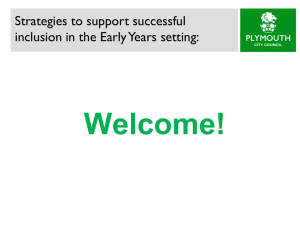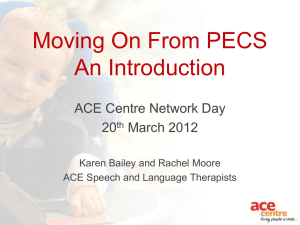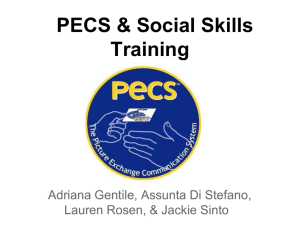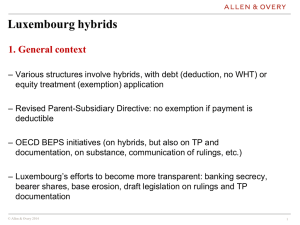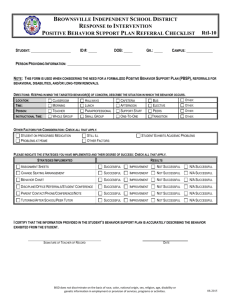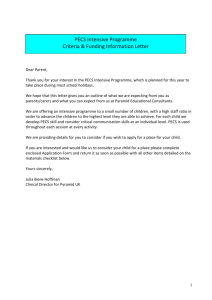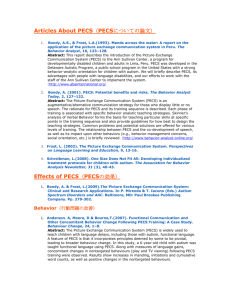Classroom Descriptions
advertisement
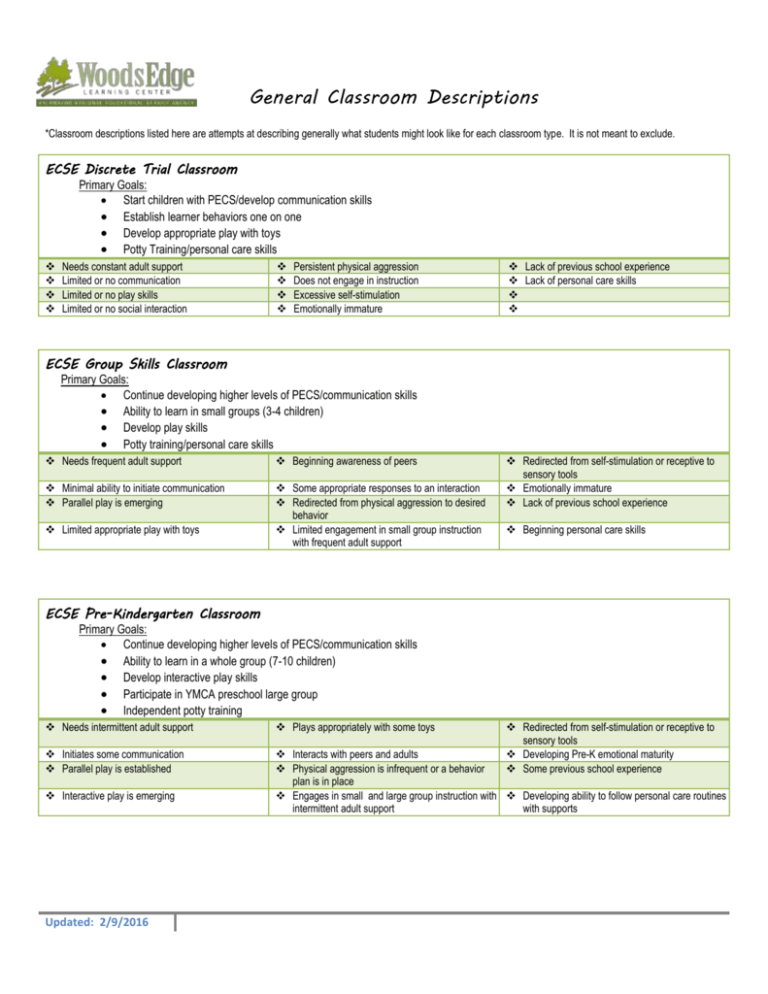
General Classroom Descriptions *Classroom descriptions listed here are attempts at describing generally what students might look like for each classroom type. It is not meant to exclude. ECSE Discrete Trial Classroom Primary Goals: Start children with PECS/develop communication skills Establish learner behaviors one on one Develop appropriate play with toys Potty Training/personal care skills Needs constant adult support Limited or no communication Limited or no play skills Limited or no social interaction Persistent physical aggression Does not engage in instruction Excessive self-stimulation Emotionally immature Lack of previous school experience Lack of personal care skills ECSE Group Skills Classroom Primary Goals: Continue developing higher levels of PECS/communication skills Ability to learn in small groups (3-4 children) Develop play skills Potty training/personal care skills Needs frequent adult support Beginning awareness of peers Minimal ability to initiate communication Parallel play is emerging Some appropriate responses to an interaction Redirected from physical aggression to desired behavior Limited engagement in small group instruction with frequent adult support Limited appropriate play with toys Redirected from self-stimulation or receptive to sensory tools Emotionally immature Lack of previous school experience Beginning personal care skills ECSE Pre-Kindergarten Classroom Primary Goals: Continue developing higher levels of PECS/communication skills Ability to learn in a whole group (7-10 children) Develop interactive play skills Participate in YMCA preschool large group Independent potty training Needs intermittent adult support Plays appropriately with some toys Initiates some communication Parallel play is established Interacts with peers and adults Physical aggression is infrequent or a behavior plan is in place Engages in small and large group instruction with Developing ability to follow personal care routines intermittent adult support with supports Interactive play is emerging Updated: 2/9/2016 Redirected from self-stimulation or receptive to sensory tools Developing Pre-K emotional maturity Some previous school experience General Classroom Descriptions ECSE Severely Cognitively Impaired Classroom Primary Goals: Improve mobility/motor skills Develop communication Improve feeding skills and oral motor skills Increase environmental responsiveness Improve fine motor skills Functions as if there is a severe cognitive impairment Has multiple impairments Limited or no personal care skills Limited mobility/physical disability Limited or no communication Limited or no ability to feed self Need for multiple therapies Needs nursing support ASD Classroom (Offsite) Primary Goals: Continue developing higher levels of PECS/communication skills Promote independence (self-care, mobility, work) Academic progress Participation in general education Appropriate behavior/social skills MI-ACCESS Participation or Supported Independence Level Limited to strong communication Emerging to developing social awareness Need for constant adult supervision, but can follow routines or simple directions without help Can occupy their time with play or leisure activity with minimal to no support Functioning as if they have a mild to moderate cognitive impairment Follows personal care routines with limited to no Ability to engage in small or large group adult support instruction/activity with supervision, visual supports and/or prompting Participate in the extended general ed. and AUEN Learner behaviors enable student to participate in curriculum the general education setting for a minimum of 30 minutes per week Updated: 2/9/2016 Self-stimulation can be redirected or self-managed Aggressive behavior may occur but is infrequent and not often dangerous with a PBSP in place (after initial adjustment) Problem behaviors can be managed through a PBSP or positive behavior supports Require some sensory breaks throughout the day General Classroom Descriptions ASD Classroom (Onsite) Primary Goals: Continue developing higher levels of PECS/communication skills Promote independence (self-care, mobility, work) Academic progress Appropriate behavior/social skills MI-ACCESS Participation Level Need for constant adult supervision Limited or no communication Little to no appropriate play with toys or leisure activities Extreme lack of social awareness Functioning as if they are severely cognitively impaired Limited or no ability to engage in small group instruction Constant adult support for personal care skills Participates in academics at a very basic pre-k, early el. level Continual or excessive self-stimulation, not always responsive to redirection Frequent problem behaviors, often dangerous to self or others, with PBSP in place Require numerous sensory breaks throughout the day Participates in work systems to develop independent skills Severely Cognitively Impaired Classroom Primary Goals: Develop a communication system (might include limited speech, voice output, PECS, eye gaze, etc.) Promote independence (self-care, mobility, work, leisure skills) Academic progress Appropriate behavior/social skills Has a severe cognitive impairment Participation level MI-ACCESS Limited or no communication Limited mobility/physical disability Needs physical therapy Has disruptive behavior Needs assistance with some/all personal care Needs assistance with some/all feeding Requires adult supervision at all times Moderately Cognitively Impaired Classroom Primary Goals: Continue developing PECS/communication skills Promote independence (self-care, mobility, work) Academic progress Appropriate behavior/social skills MI-ACCESS Supported Independence Level Limited to strong communication Need for constant adult supervision due to behavior Can follow routines or simple directions without help Updated: 2/9/2016 Follows personal care routines with limited to no adult support Participate in the extended general ed. and AUEN curriculum Functioning as if they have a moderate cognitive impairment Ability to engage in small or large group instruction/activity with supervision, visual supports and/or prompting Participates in work systems to develop independent skills Frequent problem behaviors, often dangerous to self or others, with PBSP in place Require numerous sensory breaks throughout the day Updated: 2/9/2016
